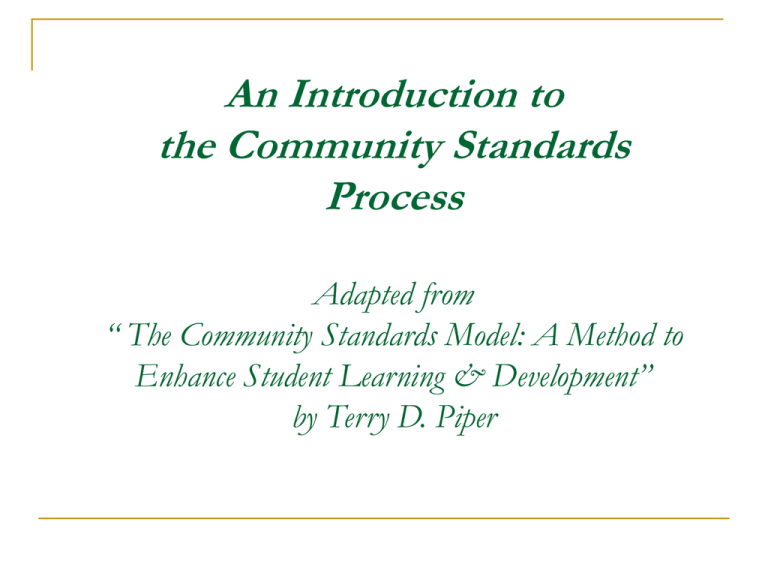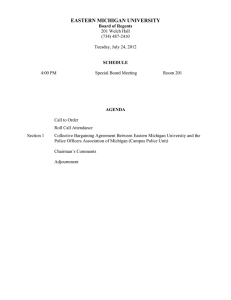An Introduction to the Community Standards Process
advertisement

An Introduction to the Community Standards Process Adapted from “ The Community Standards Model: A Method to Enhance Student Learning & Development” by Terry D. Piper From Student Life to Residential Education Complex Secretary = Office Manager Resident Assistant = Resident Advisor Complex Coordinator = Residence Director Area Coordinator = Assistant Director Assistant Director = Associate Director What are Community Standards? 1. 2. 3. Community Standards are shared agreements that define mutual expectations for how a community will function on an interpersonal level. They define how members will: Treat each other and their environment Celebrate successes Address behavioral issues How are Community Standards Established? Community Standards are determined through community consensus, which necessitates the development of… interpersonal sensitivity and understanding problem-solving skills conflict resolution skills decision-making skills What is the GOAL of a Community Standards Process? The goal of the Community Standards Process is the learning and development that occurs for individuals through participation in the standards process. The success of the Standards process relies on three key principles. Community Standards Principle # 1 Interaction: Peer interaction has been shown to be the “single most potent source of influence on growth and development during undergraduate years” (Astin 1993). Robert Kegan (1982 & 1994) suggests that, for most college students, self is defined by those with whom the student relates…the student’s sense of self is dependent upon others’ approval and liking. If Kegan is correct, then the peer group is powerful because it represents the self. The peer group is, therefore, the context in and through which significant learning can take place. Community Standards Principle # 2 Dialogue: The Standards Process creates opportunities for dialogue in which students express their points of view and hear the points of view of others. The exchange of ideas, challenge of values and beliefs, experiencing of consequences, and struggling with the gray areas create the impetus to develop a sense of self within the peer group. Community Standards Principle # 3 Perspective Taking: The ability of a student to state his or her point of view. This necessitates personal reflection and a degree of self awareness independent from peers’ influence. Hearing alternative points of view facilitates perspective-taking skills and critical thinking. How do Staff and Student INTERACTIONS Change? Staff’s primary role is no longer to control students and the environment, but to guide the community toward an understanding and implementation of individual and group responsibility and accountability based upon mutual expectation and desires. Standards replace the philosophy of control with a philosophy of individual and group empowerment. The standards process shifts the role… of staff from authority-based to facilitator-based action of student from recipient to creator of experiences What is the desired OUTCOME of the Community Standards Process? The Community Standards process actualizes principles that promote student self-authored identity development and, thereby, enhances complex reasoning and critical thinking abilities. As a result, a by-product of the Community Standards Model is a healthy community. What characterizes a HEALTHY COMMUNITY? Members openly communicating and increasing their desire for involvement Members understanding and valuing their personal contributions to the community Members actively learning: civility responsibility accountability Institutions currently using and/or implementing Community Standards. The University of Virginia New York University University of Nevada at Las Vegas Syracuse The University of Michigan Michigan State Eastern Michigan Brown University What do we need from Police Services? Communication between Police Services and Residential Life staff members on duty regarding hall incidents Duty RA involvement in confronting hall incidents where applicable and appropriate Knowledge of when Police are in the halls and for what purpose Patience -- This is a paradigm shift and will take some getting used to on all of our parts ACTION STEPS to Implement the Community Standards Process Extended RA Training-focused on CS Model and conflict resolution Roommate Contracts & Community Living Agreements Weekly Floor Meetings Weekly Programming Accountability Meetings In house judicial process

